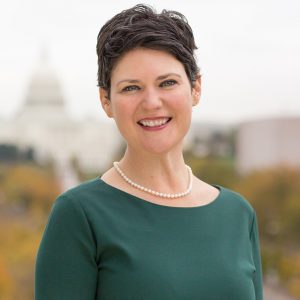
By BJC Executive Director Amanda Tyler
 In her sweeping new book, These Truths: A History of the United States, Jill Lepore writes about summer 1619 in Jamestown: “Twenty Englishmen were elected to the House of Burgesses. Twenty Africans were condemned to the house of bondage. Another chapter opened in the American book of genesis: liberty and slavery became the American Abel and Cain.”
In her sweeping new book, These Truths: A History of the United States, Jill Lepore writes about summer 1619 in Jamestown: “Twenty Englishmen were elected to the House of Burgesses. Twenty Africans were condemned to the house of bondage. Another chapter opened in the American book of genesis: liberty and slavery became the American Abel and Cain.”
It seems appropriate that this summer, as we commemorate the 400th anniversary of the first enslaved Africans brought to British America, that we dedicate much of this issue of Report
from the Capital to religious liberty and race. We share in these pages powerful challenges issued by the Rev. Dr. Aidsand Wright-Riggins at the 2019 Shurden Lectures hosted by Central Baptist Theological Seminary in March, and those from Dr. Corey Walker and Dr. Linda McKinnish Bridges at the BJC Dinner held in conjunction with the Alliance of Baptists Annual Gathering in Washington, D.C., in April.
These voices “complicated the narrative,” as the newly popular phrase goes, urging us to think about the implications of the fact that our modern-day constitutional right of religious libertywas born in a country that had slavery as one of its founding values. “All men are created equal” was a cruel aspiration in the stark reality of enslavement, despite the Declaration of Independence’s claim.
I asked Dr. Walker about the apparent contradictions in the Colonial era: Founders like Jefferson and Madison espoused religious freedom while owning slaves; Baptist leaders like John Leland fought for religious liberty while not maintaining the same force of advocacy for abolition throughout their lives. He gently responded by saying that, in his view, it’s not a contradiction but instead entirely consistent. Jefferson, Madison and Leland (among others) were fighting for religious liberty for the people that they considered to be human.
From our beginning more than 80 years ago, BJC has brought together a diverse group of Baptists, united in their commitment to religious freedom. But, regrettably, our coalition has not always represented or included the full breadth of our denominational partners and their understandings of religious freedom. I hope that, as we delve into the history of religious liberty and how we have lived it in our denominational and organizational history as Baptists and Americans, we will deepen not only our understanding of but also our commitment to protecting our neighbors’ freedom as our own.
As we add more voices and perspectives to these discussions, our defense of religious freedom will be more robust and, I believe, more successful in defending and extending religious liberty for all. These conversations are difficult and may be painful, but they are necessary if we are to achieve our mission of defending religious freedom for all of God’s children — those who share our religion, those who practice a different faith, and those who do not claim a given spiritual tradition. Religious liberty for all will only be a reality when we revise any theology or ideology that
renders some of our neighbors to be less than human.
To lead these complicated conversations, we know we have to speak with honest clarity about what we mean when we say “religious liberty.” This summer is an important time at BJC as we equip advocates like you with the resources you need to talk about freedom with your neighbors, at your family gatherings, in your workplaces and community spaces, and with your social media networks.
On June 21, you will see a new look for BJC, one that we hope captures the immediate relevancy of our work, expresses the excitement and passion of BJC in action and invites more people to join with us. We are revamping BJConline.org to be more accessible and action-oriented. We are eager to welcome more advocates into our work, learning from each other about how we can best respond to the many challenges we face today. I hope you will save that date and join us on Facebook during our luncheon to learn more about how you can be a part of BJC’s exciting future.
Our shared future will undoubtedly mean continuing to take critical and authentic appraisals of our past. Defending religious liberty for all will take all of us working together. My hope is that we make “all” a reality, not just aspirational, for the generations that follow.




